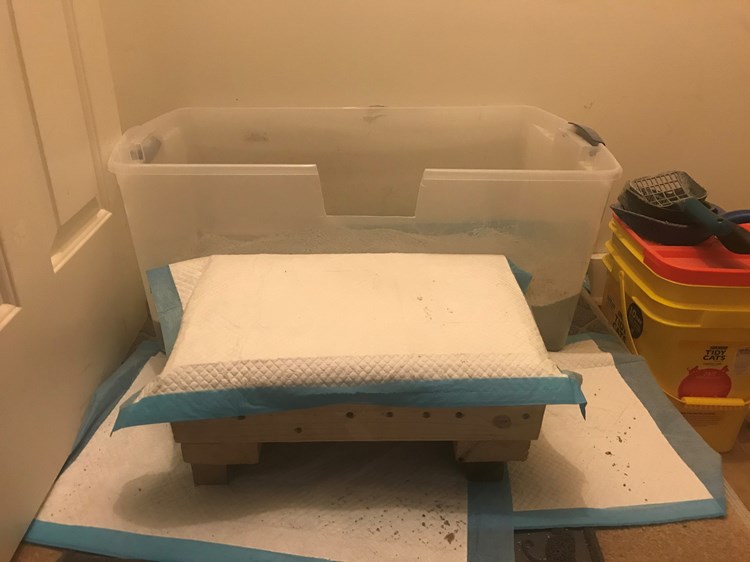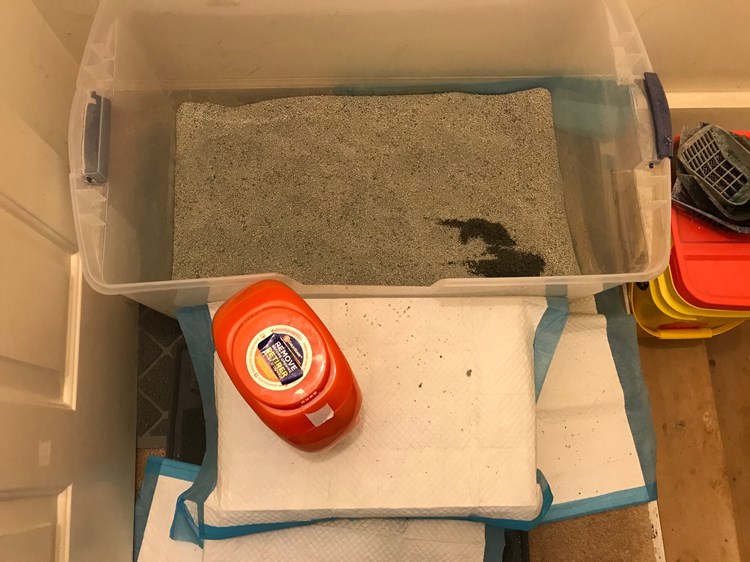Here's how to stop your cat from peeing over the side of the litter box
If your cat has begun to get up in age, and painful arthritis has started to kick in, your cat may not be squatting down enough for the litter box to catch his pee stream. Unfortunately, as my cat has gotten older (14+), he developed arthritis in his hind legs and started to occasional pee out the front of the litter box. This started getting worse and worse and diabetes made his pee trips even more common over the course of the day. My cat has always pooped in the back of the litter box and pee'd in the front of the litter box (just after entering), and not the back of the litter box with a higher wall, so this pee problem became worse and worse. For the longest time, I had used a Nature's Miracle High-Sided Litter Box with a pee catch in the front, and this worked well when my cat was healthier and squatted down each time to pee, but as his health deteriorated this litter box no longer worked all the time to contain my cats urine stream from reaching the floor.
My first solution was to just use WeeWee Pads placed on the floor just outside of the Nature's Miracle litter box to contain the occasional pee over shoot, but I soon found out that I needed to change out the pad on a regular basis because my cat was peeing over the edge of the litter box constantly. So at that point I knew I needed to come up with a better solution. What I came up with was a DIY high sided litter box that my cat has not been able to pee over the edge and is still able to get in and out of the litter box without too much trouble.
Things you'll need:

Here's the Steps to Make a DIY Litter Box so Your Cat Can't Pee Over the Edge:
1) (optional) It's a good idea to warm / heat up Sterilite 105 Qt. Plastic Box with a hair dry so that it's easier to cut and doesn't shatter or crack when cutting. If you're doing this in the winter months, it's easy to crack the plastic if you're not careful.
2) Use the Tin Snips (or plastic cutting tool) to cut an opening in the Sterlite Plastic Box. I cut 3 1/4" down from the top of the box, and about 6" wide. You want to make sure that there is at least 10" of plastic from the floor. Trim or sand down any rough edges. NOTE: My first attempt at cutting the plastic, I made the opening height too high, and my cat was able to pee out... On my second attempt, right around 3" to 3 1/4" seems to work for my cat, with a good amount of kitty litter in the box.
3) Now build the step platform that your cat will step up onto, before stepping down into the litter box. I just used scrap 2x4 wood to build the step and then used the top to an old wine rack for the platform. Essentially the dimensions of the step I built are 16" Width x 10" Length x 7 1/2" Height. So use the small piece of plywood and cut the top of the step platform to the dimension (16" x 10"), then you could cut four 2x4's to the height of 7" (depending on how thick your plywood) and then screw in the four legs... use additional pieces for more support if needed. Sand down any rough edges.
4) Now put the DIY litter box in a location where your cat can easily access it without walking up or down too many stairs. NOTE: I keep this large litter box / cat step on the first floor at the top of my basement stairs, and have enough room to walk down to the basement (which is where my cat's litter box was located in the past when he was young and healthy).
5) I place a WeeWee Pad on the top of the step platform, so that my cat doesn't ruin the top of the wood platform with wet urine / etc. if he accidently steps in it... I can always just replace the WeeWee Pad. I use packaging tape / scotch tape to tape the WeeWee Pad to the front of the step, and then just push the step back so that it touches the plastic box, which keeps the WeeWee Pad from moving. It's easy to change, if the pad gets dirty. Any lose kitty litter that tracked up onto the pad can easily be cleaned up by picking the step up, and dumping the lose litter back into the litter box.
6) That's it... hope this helps you and your cat live a better life!
UPDATE 6-1-2020: I added a smaller 2" step and made the opening of the litter box a few inches wider (see picture on sidebar)
Just a side note, my cat will still pee at the front entrance of the litter box, just after stepping down (usually off to the side), so if I don't clean out the litter box often, he may accidently step in his wet kitty litter (luckily this doesn't happen often). I'm still not sure if there is a solution for getting him to pee in a different spot other than the front, but I suspect if the Litter Box was deeper (30" wide x 30" length), he may walk in farther in before peeing, but I'm not sure. I've since made the opening a few inches wider, but that almost made the issue worse since there's more options. So if you have any suggestions, feel free to let me know.

UPDATE 6-15-2020: So I was able to get my cat from peeing in the entry way, by simply putting a Tide Pods container (that I pulled out of my recycle bin) and placing it at about a 45 degree angle so when my cat walks into the litter box, he is already turned about 45 degrees. This causes him to turn even more after stepping into the litter box before peeing. Before he would often walk straight into the litter box, and only turn slightly, which he would then proceed to pee directly in front of the opening. Obviously, you don't need to use a Tide Pods container, you could use a block of wood, cans, or some other object to redirect your cat to it's preferred side when peeing (my cat pees off to the right, his head to the left of the litter box). Hope that helps.